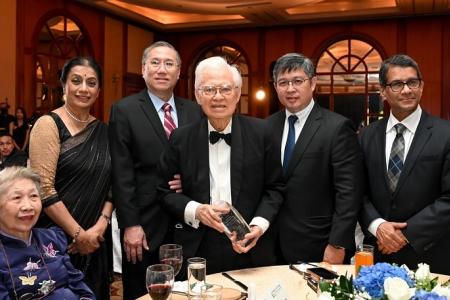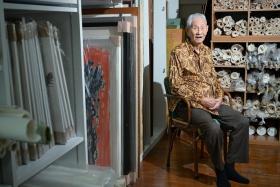Singapore’s pioneer kidney transplant surgeon dies at 95
On July 8, 1970, Dr Chan Kong Thoe created medical history in Singapore when he gave Ms Doreen Tan, then 29, a new lease of life with the country’s first kidney transplant.
In the 55 years since then, surgeons here have done thousands of kidney transplants – with organs from living and dead donors. Transplants give patients with kidney failure a longer life expectancy, as well as a better quality of life.
On Feb 1, 2025, Dr Chan died at the age of 95. He leaves his wife, Dr Chan Tuck Kin, three daughters, six grandchildren and one great-granddaughter.
Professor A. Vathsala, director of the National University Centre for Organ Transplantation, described Dr Chan, who served two terms as president of the prestigious Tanglin Club, as a “pioneering figure in Singapore’s medical history”.
She said the first transplant operation he did in 1970 “set the stage for living donor kidney transplant and subsequent organ transplant operations of the heart, liver, lungs and pancreas to be performed in Singapore over the subsequent five decades”.
She added: “His vision and commitment to advancing medical practice have left an enduring legacy in the field of organ transplantation in Singapore, saving countless lives through his pioneering work, and inspiring future generations of surgeons, transplant physicians and healthcare professionals in Singapore.”
Prof Vathsala said Ms Tan “lived on with excellent kidney function for nearly 22 years”.
Professor Kenneth Mak, Singapore’s director-general of health, expressed his gratitude to Dr Chan for “saving the lives of many patients with kidney failure”.
Prof Mak said the pioneering transplant operation “enabled this life-saving treatment to be established in Singapore as a standard treatment for kidney failure”.
“Since then, many other patients with kidney failure have benefited from kidney transplants from both deceased and living donors. We encourage Singaporeans to consider pledging their organs as a gift of life when they pass away.”
The first organ recipient, Ms Tan, had suffered from kidney disease for several years before the transplant. She had been on dialysis for some months when a cadaveric kidney became available.
She was actually third in line for a transplant. But one of the two patients ahead of her had died, while the other was ill, and so could not undergo a transplant.
The donor, Mr Yee Kwok Chong, was only 20 years old. He was in hospital with a brain tumour. When doctors told his mother that he was near the point of death, she agreed to donate his kidney.
Dr Chan, who was then head of the University of Singapore’s department of surgery, spent three hours on the operation to put the kidney into Ms Tan’s left side. Another team had removed the kidney from Mr Yee.
The procedure at Singapore General Hospital (SGH) was considered “experimental”. The team involved had practised on dogs in the year before the first human transplant.
It was only after the operation that Dr Chan found out that the donor had died of a brain infection, and not a brain tumour. But he decided to leave the kidney in place, and to fight any infection it might cause.
Things went well and within days, Ms Tan was able to sit up and chat with her husband during his daily visits. She was discharged from hospital in September that year.
However, the drugs she needed to take following the transplant caused arthritis in her left hip joint. Today, the drugs needed by transplant patients are far less toxic.
Four years after the transplant, Ms Tan could no longer walk without crutches. However, she was still grateful for the new lease of life that the transplant gave her, and she did much to help other kidney transplant patients with advice and encouragement.
Twenty years to the day, Ms Tan and Dr Chan were at a reunion in 1990 to commemorate the occasion at SGH’s Bowyer Block, where the surgery took place. About 150 people, including more than 40 other kidney recipients, attended the event.
Dr Chan’s wake is being held at Woodlands Memorial’s Island Hall till Feb 5.
Get The New Paper on your phone with the free TNP app. Download from the Apple App Store or Google Play Store now


